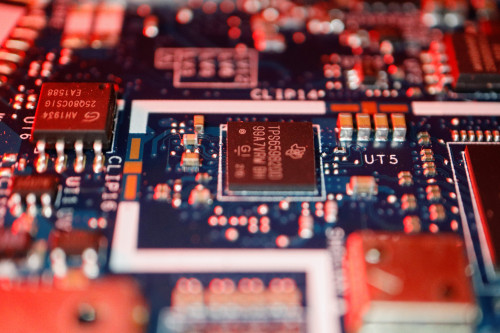By Karen Freifeld
NEW YORK (Reuters) -The Trump administration is working on changes to a Biden-era rule that would limit global access to AI chips, including possibly doing away with its splitting the world into tiers that help determine how many advanced semiconductors a country can obtain, three sources familiar with the matter said.
The sources said the plans were still under discussion and warned they could change. But if enacted, removing the tiers could open the door to using U.S. chips as an even more powerful negotiating tool in trade talks.

Ad RAD Intel
From Unknown to Unstoppable: The Pre-IPO AI Opportunity You Can Still Grab
You know that moment when a company goes from "never heard of" to "suddenly everywhere?" That's RAD Intel – and you can still invest. The company's valuation has already exploded 16X, from $5m to $85m and is growing despite market uncertainty.
Here's why insiders love them. They're helping Fortune 500 brands like Hasbro and MGM truly understand their audiences in real time - not just guess. It's AI that actually works. Pre-IPO, and fixing a multi-trillion dollar problem.
The company's proprietary AI-tech teaches brands how to create and deliver content that reads the room. RAD's tech helps brands understand why content works, who it actually resonates with, and what to say next. Now, brands can stop guessing and start making ads that actually land.
This company is on fire. Shares are just $0.60 – with backing from Adobe and Fidelity. Strength attracts strength: over 6,000 investors are in, including insiders from Google, Meta, and Amazon.
Get the full details before the next price change on 5/29.
DISCLOSURE: This is a paid advertisement for RAD Intel's Reg A offering. Please read the offering circular and related risks at invest.radintel.ai.
The regulation, which was issued in January, is aimed at dividing up access to the most advanced AI chips and controlling certain model weights in order to keep the most sophisticated computing power in the United States and among its allies, and away from China and other countries of concern.
The Framework for Artificial Intelligence Diffusion, as the rule is called, was issued by the U.S. Department of Commerce in January, a week before the end of the administration of former President Joe Biden. Companies must comply with its restrictions starting on May 15.
Currently, the rule has the world divided into three tiers. Seventeen countries and Taiwan in the first tier can receive unlimited chips. Some 120 other countries are in the second tier, which leaves them subject to caps on how many AI chips they can get. And countries of concern like China, Russia, Iran and North Korea in the third tier are blocked from the chips.
But Trump administration officials are weighing discarding the tiered approach to access in the rule and replacing it with a global licensing regime with government-to-government agreements, the sources said.
“There are some voices pushing for elimination of the tiers,” Wilbur Ross, who served as Commerce secretary during the first Trump administration, said in an interview on Tuesday. “I think it’s still a work in progress.” He said government-to-government agreements were one alternative.
Such a structure would likely tie in to President Donald Trump’s broader trade strategy of making deals with individual countries, one of the sources said. That would make it easier for the U.S. to use access to American-designed chips as leverage in other negotiations.
U.S. Commerce Secretary Howard Lutnick said at a conference in March that he wants to include export controls in trade talks.
Other possible changes include a lower threshold for an exception to licensing. Under the current rule, orders under the equivalent of about 1,700 of Nvidia’s powerful H100 chips do not count toward country caps and only require the government be notified about the order. No license is necessary.
The Trump administration is considering making the cutoff orders under the equivalent of 500 H100 chips, one source said.
A spokesperson for the Commerce Department declined comment. A spokesperson for the White House did not immediately respond to a request for comment.
For months, Trump administration officials have suggested they want to make the rule “stronger but simpler,” but at least some experts believe removing the tiers will make the rule more complicated.
Ken Glueck, executive vice president at Oracle, a critic of the current rule, said that the tiers did not make sense, noting that Israel and Yemen were both in the second tier.
“Wouldn’t surprise me they’re going to take a new look at this,” said Glueck, who said he did not know the Trump administration’s plan but expects the rule to be modified in a significant way.
Oracle and Nvidia were both outspoken in their criticism of the new rule when it was issued in January.
Industry has argued that by limiting access to the chips, countries will buy the technology from China. Some U.S. lawmakers have agreed. Seven Republican senators sent a letter to Lutnick in mid-April asking for the rule to be withdrawn.
The restrictions would incentivize buyers, especially in Tier 2 countries, to turn to China’s “unregulated cheap substitutes,” the letter said.
(Reporting by Karen Freifeld in New York; Additional reporting by Alexandra Alper in Washington. Editing by Chris Sanders and Matthew Lewis.)






